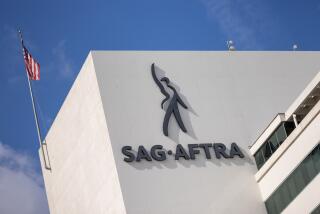Tension Increasing Over Restrictions on Star Footage
- Share via
An attempt by Tom Cruise’s publicity handlers to place unprecedented restrictionson TV coverage related to the film “Eyes Wide Shut” has drawn attention to a growing source of tension between broadcast outlets and stars--namely, the explosion of channels and programs that exploit celebrity images, not always in a flattering way.
A consent agreement recently distributed to news outlets by Cruise’s publicity representative, PMK, laying down conditions for interviewing the star, contained provisions to block the showing of “bloopers” and “errors or misstatements” as well as to bar future use of the footage.
In addition to asking that the program “not show [Cruise] in a negative or derogatory manner,” the waiver, obtained by The Times, also specified that material not aired from interviews with the actor “will not be used for any purpose whatsoever and at the artist’s election will be destroyed,” saying producers must present PMK with “evidence of such destruction.”
While not all publicists go to those lengths, they increasingly believe establishing such guidelines is necessary to prevent portions of interviews from turning up later in venues for which they weren’t originally intended. Beyond biographical or nostalgic fare such as MSNBC’s “Time and Again,” A&E;’s “Biography” and E! Entertainment Television’s “True Hollywood Stories,” stars have reason to be cautious, they say, of programs that use snippets of video to lampoon celebrities.
David Brokaw, whose publicity firm represents Bill Cosby, said the mean-spirited nature of some programs and the expansion of outlets compel stars to protect their rights or risk forfeiting them.
“We insist on an understanding that when [Bill] makes an appearance on a show, it is done for that show, and that show only,” he said. “If they want to use it again for any other reasons, they have to come back and get those rights.” Brokaw added that because interviewers frequently “sit down and talk [to a star] for a half-hour and use four sentences,” there’s a need to guard against the exhibition of excess material down the road.
PMK founder Pat Kingsley expressed similar concerns this week regarding the recycling of old interviews--an attractive idea to programmers, since archival and library footage offers an inexpensive way to fill out their schedules. Kingsley has sought to confine interviews to airing only in connection with the project they are meant to promote.
ABC News did agree to limit future exposure of Cruise’s interview in securing the first TV chat with him on “20/20” and “Good Morning America.” A network spokeswoman said ABC didn’t accept other proposed restrictions, such as a request in the waiver--later deleted by PMK and dismissed as “a mistake”--that news outlets provide the agency a rough cut prior to airing the story.
A spokeswoman for “Larry King Live,” which interviewed Cruise on Thursday, said the program made no editorial concessions but did agree that the interview could run only in its entirety, meaning no clips or excerpts could be used.
While Cruise is among the most guarded celebrities in terms of his image, news sources say the issue ultimately comes down to publicists in general--and PMK in particular--seeking to exercise undue influence over news content.
“The big stars are getting more and more isolated and they are more and more controlling,” said one producer. “We’re going to get to the point where we just pass, where there are some stars we won’t interview.”
The fear, of course, is that competing news outlets will consent to onerous conditions to land star interviews, boosting their ratings in the process. PMK, for example, was said to have been upset with NBC’s “Today” program because of a recent interview conducted with one of its clients, “Ally McBeal’s” Calista Flockhart. Insiders say that may have contributed to the Cruise interview going to ABC.
Jim Van Messel, executive producer of “Access Hollywood,” stressed his program doesn’t sign consent agreements like the one issued by PMK but will provide assurances that interviews will appear on the syndicated entertainment news show and nowhere else. A spokeswoman for “Entertainment Tonight” also said they do not sign consent agreements.
More to Read
The complete guide to home viewing
Get Screen Gab for everything about the TV shows and streaming movies everyone’s talking about.
You may occasionally receive promotional content from the Los Angeles Times.






